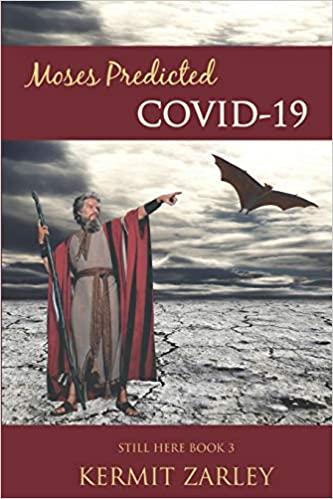 The thesis of my book, Moses Predicted COVID-19, is that there is a surprising and largely undiscovered correlation between the past nine major zoonotic diseases–an animal transmitting a deadly coronavirus to a human–and Moses’ food laws in the Bible. I conclude in this book that if the world (Gentiles) would take notice of this and make some adjustments accordingly, it would prevent a lot of these pandemics such as the present COVID-19 that we have been suffering for over a year now.
The thesis of my book, Moses Predicted COVID-19, is that there is a surprising and largely undiscovered correlation between the past nine major zoonotic diseases–an animal transmitting a deadly coronavirus to a human–and Moses’ food laws in the Bible. I conclude in this book that if the world (Gentiles) would take notice of this and make some adjustments accordingly, it would prevent a lot of these pandemics such as the present COVID-19 that we have been suffering for over a year now.
These Mosaic food laws are listed in Leviticus 11 and Deuteronomy 14. When God gave Moses the Ten Commandments at Mount Sinai, he also gave Moses these and other laws. These food laws pertain only to animals. They begin by distinguishing animals as “clean” and “unclean.” Thus, the Hebrew people were told they could eat the clean animals, such as cattle, sheep, goats, and deer, but not the unclean animals, such as pigs, rabbits, etc. These laws also pertain to fish, birds, insects, and crawlers. But my main point is the instructions about what to do when touching animal carcasses. You’ll have to read the book about that.
For thousands of years, people have debated why this division of animals and the instruction not to eat the unclean animals. The most popular reason given has been that the unclean animals symbolically refer to something negative. And a large majority of biblical scholars have claimed that these food laws have no hygienic basis.
I claim in my book that, although sometimes there may be a legitimate interpretation of these Mosaic food laws that is symbolic, the primary and divine basis for them is that they have a hygienic basis. (The texts only say that in observing these food laws, the Hebrews would be “holy,” meaning set apart to their God.) That is why I believe the world should take notice of these food laws, though I don’t claim that we all should live kosher, which is how religious Jews describe their keeping of these food laws.
The main objection that Christians raise to this hygienic interpretation of Moses’ food laws regards something that happened with Jesus and the Pharisees. They asked Jesus, “Why do your disciples not live according to the tradition of the elders, but eat with defiled hands?” (Mark 7.5). Their tradition was that nothing, not just meat, could be eaten until their hands were washed, and they required washing of the food and utensils used to cook and eat with.
Jesus then gave a rather convoluted answer which clearly denied that hands must be washed before eating. Yet most scholars and English Bibles depart from this context by claiming Jesus’ answer was a subtle rejection of Moses’ food laws. The crux of the matter regards the Greek text of Mark 7.19b which says, panta ta bromata katharizon. These words usually are translated in English Bibles, “Thus he [Jesus] declared all foods clean.” This is certainly a parenthetic explanation by the author of the Gospel of Mark about his previous recording of this event. But the simplest of English renderings of this text would be something resembling Matthew’s account of it. Matthew does not have panta ta bromata katharizon; he has “to eat with unwashed hands does not defile” (Matthew 15.20), which is keeping with the context.
Other biblical texts show clearly, I think, that Jesus could not have abolished Moses’ food laws. For example, when Jesus began his public, itinerant ministry, he said near the beginning of his Sermon on the Mount, “Do not think that I have come to abolish the law or the prophets. I have come not to abolish but to fulfill” (Matthew 5.17 NRSV).
Christians who have so interpreted Mk 7.19b also have cited other New Testament texts, including one by Paul in Romans 14. Its context is that Paul writes about believers at Rome wrongly judging each other about being vegetarian. Paul then says of food, “nothing is unclean in itself” (v. 14). Many Christians have presumed Paul means this of Moses food laws, in which case Paul abolishes them. But that interpretation is out of context. Paul only means there is nothing wrong with eating meat in general.
Yesterday, I read another scripture that pertains to this subject about the apostle Paul, and I now wish I would have included it in my book. Paul had been taken captive for preaching about the resurrection of the dead (Acts 24). As he stood before Governor Felix defending himself, Paul said, “I admit that I worship the God of our fathers, as a follower of the Way, which they call a sect. I believe everything that agrees with the Law and that is written in the Prophets” (v. 14). Thus, Paul could not have meant in any of his writings, such as Romans 14.14, that he rejected Moses’ food laws.
Thus, Jesus and Paul were obedient to the Law of Moses, being good kosher Jews, and thus kept its laws about eating clean animals and not eating unclean animals.













